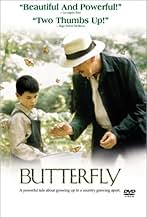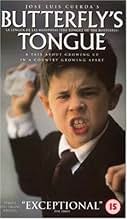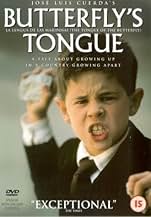IMDb-BEWERTUNG
7,6/10
10.335
IHRE BEWERTUNG
Füge eine Handlung in deiner Sprache hinzuSpain, 1936. Moncho is an outcast at school but is able to form a strong bond with his outspoken teacher. When fascism arrives to Spain, his teacher is considered an enemy of the regime.Spain, 1936. Moncho is an outcast at school but is able to form a strong bond with his outspoken teacher. When fascism arrives to Spain, his teacher is considered an enemy of the regime.Spain, 1936. Moncho is an outcast at school but is able to form a strong bond with his outspoken teacher. When fascism arrives to Spain, his teacher is considered an enemy of the regime.
- Regie
- Drehbuch
- Hauptbesetzung
- Auszeichnungen
- 6 Gewinne & 19 Nominierungen insgesamt
Elena Bagutta
- Carmiña
- (as Elena Fernández)
Roberto Vidal Bolaño
- Boal
- (as Roberto Vidal)
Antonio Lagares
- Alcalde
- (as Tucho Lagares)
Empfohlene Bewertungen
In this film, we see Spain lurching toward the brink of the Spanish Civil War through the huge uncomprehending eyes of the child Moncho. The metaphor for "Butterfly" has many complex applications in this film but for me the most profound of them was the moment that Moncho's saintly teacher captures a butterfly in a net, tenderly observes it and then sets it free. If only the future of Spain had been in such sensitive hands. As the film progresses through its beautifully photographed scenes of ordinary life, the reality of the evils of Fascism and the hope of the Republicans begin to chasm the serenity of the land.
The film is not about war, it is rather, about how much personal honor people will trade for an idea of security for themselves and their families. In a way, it parallels the dilemma in the scene in Eisenstein's STRIKE in which a woman with starving children is thrown a coin by one of the factory bosses. Wonderfully executed performances in a profoundly moving film. -Rowena Silver
The film is not about war, it is rather, about how much personal honor people will trade for an idea of security for themselves and their families. In a way, it parallels the dilemma in the scene in Eisenstein's STRIKE in which a woman with starving children is thrown a coin by one of the factory bosses. Wonderfully executed performances in a profoundly moving film. -Rowena Silver
This was a film that really tugged at the heart strings. I really enjoyed the building of characters and the way the lives of the village were portrayed. It was a difficult time politically, yet the simplicity of daily life and family in Galicia was the over-riding story here. The acting is second to none and Manuel Lozano was unbelievably fantastic! I mean these ridiculous "affected" children they get for American movies (i.e. the "Pepsi" girl) are so unbelievable and fake. Manuel is so realistic as Moncho. So are the other actors.
I don't necessarily agree with the way that Cuerda rushed the ending, but I certainly wouldn't want to take away any time in portraying the lives of everyone involved. Maybe he should have made it a little longer as not to rush the ending. Although I will say that one of my favorite things about foreign films is that they are so NOT "Hollywood" that you never really know what to expect. Unlike the trite, unbelievable, over-acted, high budget American films and their overpaid actors which usually just leave a bad taste when I exit from the theatre.
This is an historical piece that absolutely shames "the Patriot". It's so nice to see that a movie doesn't have to change history to show us the past and entertain us at the same time!
I don't necessarily agree with the way that Cuerda rushed the ending, but I certainly wouldn't want to take away any time in portraying the lives of everyone involved. Maybe he should have made it a little longer as not to rush the ending. Although I will say that one of my favorite things about foreign films is that they are so NOT "Hollywood" that you never really know what to expect. Unlike the trite, unbelievable, over-acted, high budget American films and their overpaid actors which usually just leave a bad taste when I exit from the theatre.
This is an historical piece that absolutely shames "the Patriot". It's so nice to see that a movie doesn't have to change history to show us the past and entertain us at the same time!
Adapted by screenwriter Rafael Azcona from three stories in Manuel Rivas novel "Que Me Quieres, Amor", Butterfly is a rare and insightful coming-of-age story that takes place in a rural part of northern Spain during the Second Republic when Spain had a brief flirtation with socialism and democracy. Against a background of the growing clouds of the Spanish Civil War, the film depicts the relationship between asthmatic 7-year old Moncho (Manuel Lozano) and his liberal schoolteacher played by the great Spanish actor Fernando Fernan Gomez (All About my Mother, The Grandfather).
Butterfly does not directly involve politics (at least until the end) but tells its story through snapshots of young Moncho, In the beginning, he is a quiet, shy boy who is afraid go to school because he thinks his teacher, Don Gregorio, will hit him. Gregorio, however, is a kind spirit who teaches his students to appreciate poetry, the beauty of nature, and the spirit of loving one another. Moncho grows from a frightened child to an enthusiastic young boy who is eager to learn all that he can about life. He divides his time between following his older brother's exploits playing the saxophone in a local band and chasing butterflies with his teacher friend. The butterfly here seems to be a symbol both of freedom and transformation.
I felt very involved with this young boy's world and found Lozano to be one of the most beguiling child actors that I have seen in a long time. His performance alone saves the film from Miramax-type sentimentality (which it occasionally drifts towards). Gomez is also wonderful as the compassionate teacher, symbolizing the humanitarian government that Spain enjoyed before the onset of fascism.
Eventually, Moncho must choose between his love for the teacher who opened his eyes to the beauty and wonder of the natural world and the ugly pressures of his family and neighbors to take sides in the political conflict. With the ending as shocking and memorable as Truffaut's The 400 Blows, Butterfly powerfully illuminates the human cost of war.
Butterfly does not directly involve politics (at least until the end) but tells its story through snapshots of young Moncho, In the beginning, he is a quiet, shy boy who is afraid go to school because he thinks his teacher, Don Gregorio, will hit him. Gregorio, however, is a kind spirit who teaches his students to appreciate poetry, the beauty of nature, and the spirit of loving one another. Moncho grows from a frightened child to an enthusiastic young boy who is eager to learn all that he can about life. He divides his time between following his older brother's exploits playing the saxophone in a local band and chasing butterflies with his teacher friend. The butterfly here seems to be a symbol both of freedom and transformation.
I felt very involved with this young boy's world and found Lozano to be one of the most beguiling child actors that I have seen in a long time. His performance alone saves the film from Miramax-type sentimentality (which it occasionally drifts towards). Gomez is also wonderful as the compassionate teacher, symbolizing the humanitarian government that Spain enjoyed before the onset of fascism.
Eventually, Moncho must choose between his love for the teacher who opened his eyes to the beauty and wonder of the natural world and the ugly pressures of his family and neighbors to take sides in the political conflict. With the ending as shocking and memorable as Truffaut's The 400 Blows, Butterfly powerfully illuminates the human cost of war.
Among recent Spanish films - and I refer to the last twenty five years -there has been some tendency towards an intimistic approach which rather limits deeper comprehension and the ability to grasp essential concepts for non-Spanish audiences, whether the film is dubbed or subtitled into English or not, or even for Spanish speaking people in Latin America. This causes certain difficulties, similar to what happens when European or North American audiences try to comprehend Chinese or Japanese films requiring knowledge of their history, culture, mores and values. This has certainly been the case with `Las Ratas' (1998) directed by Giménez Rico, and to some degree with other Spanish masterpieces such as `El Sur' (1982), `Los Santos Innocentes' (1984), and to a lesser extent with `El Abuelo' (1999) - reviewed elsewhere in IMDb. Perhaps for general audiences `La Plaza del Diamante' (1981, Francisco Beltrú), `Últimas Tardes con Teresa' (1983, Gonzalo Herralde), and `Las Bicicletas son para el Verano' (1983, Jaime Chávarri) are rather more accessible, but even so many nuances might be lost. This may well happen to many audiences watching the film known as `Butterfly' in English. The story is set in the north western region of Galicia during the winter and spring preceeding the outbreak of the Civil War, and told through the eyes of a little boy - Moncho (Manuel Lozano) - a tailor's son and younger brother of a would-be saxophonist. The film is a point-counterpoint on the values of friendship, loyalty and other feelings so common to ordinary townspeople living their easy and uncomplicated village lives, values which just break down under fear. You have to understand certain principles of Spanish behaviour veering from foolhardy courageousness to outright cowardice, from close friendship to open hostility, superbly summed up in the close-up final shot of Moncho's face, half angry and embittered, half bewildered and confused, as the lorry drives away. Fernando Fernán-Gómez is masterful as the lonely schoolteacher and Manuel Lozano as Moncho is definitely something very special. Watch out for Fernán-Gómez directing Manuel Lozano in `Lázaro de Tormes' (based on an anonymous medieval tale) and José Luis Garci directing him in `You're The One" (both 2000). `La Lengua de las Mariposas' is also highly recommendable for its beautiful photography in the lushly wooded green hills and valleys around Allariz and the River Arnoia in Ourense, one of the four provinces of Galicia. Worth 8 out of 10.
It's a beautiful (and too rare) thing to witness a child actor who can avoid the saccharine cutesiness so common to mainstream American child actors. In this film full of children there are, happily, no cloying, exaggerated "cute kid" moments.
The real beauty of La lengua de las mariposas is what's unspoken -- the truths that remain between the lines. The film's political theme is never heavy-handed, and its vivid and fascinating depiction of a turbulent moment in Spanish history has inspired in me a desire to learn more. Without spoiling the ending (which I read as fairly subversive, at least to an American audience), I must say I wasn't entirely surprised at what happened. It brought a tear to my eye and it's still making me think, three days later.
Those who liked this film should also see La Vita e Bella (Life Is Beautiful) and La notte di San Lorenzo (Night Of Shooting Stars), which are similar and may appeal equally, if not more.
The real beauty of La lengua de las mariposas is what's unspoken -- the truths that remain between the lines. The film's political theme is never heavy-handed, and its vivid and fascinating depiction of a turbulent moment in Spanish history has inspired in me a desire to learn more. Without spoiling the ending (which I read as fairly subversive, at least to an American audience), I must say I wasn't entirely surprised at what happened. It brought a tear to my eye and it's still making me think, three days later.
Those who liked this film should also see La Vita e Bella (Life Is Beautiful) and La notte di San Lorenzo (Night Of Shooting Stars), which are similar and may appeal equally, if not more.
Wusstest du schon
- WissenswertesOn one of their walks home (at 0:38:41), Moncho asks Andrés whether he knows what a tilonorrinco is and proceeds to talk about an Australian bird. In Spanish tilonorrinco is what in English is called the satin bowerbird (Ptilonorhynchus violaceus), a bowerbird endemic to eastern Australia.
- SoundtracksEn er mundo
Written by Juan Quintero (as Juan Quintero Muñoz) and Jesús Fernández Lorenzo
Top-Auswahl
Melde dich zum Bewerten an und greife auf die Watchlist für personalisierte Empfehlungen zu.
- How long is Butterfly?Powered by Alexa
Details
- Erscheinungsdatum
- Herkunftsland
- Offizieller Standort
- Sprachen
- Auch bekannt als
- Butterfly
- Drehorte
- Produktionsfirmen
- Weitere beteiligte Unternehmen bei IMDbPro anzeigen
Box Office
- Bruttoertrag in den USA und Kanada
- 2.092.682 $
- Weltweiter Bruttoertrag
- 7.738.129 $
- Laufzeit
- 1 Std. 36 Min.(96 min)
- Farbe
- Sound-Mix
- Seitenverhältnis
- 2.35 : 1
Zu dieser Seite beitragen
Bearbeitung vorschlagen oder fehlenden Inhalt hinzufügen




























